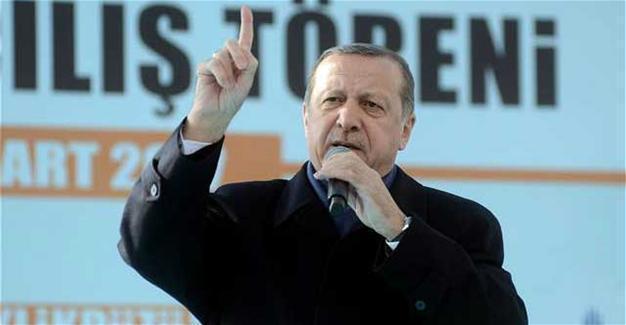Atatürk would have said ‘yes’ in referendum, President Erdoğan says
ANKARA
 President Recep Tayyip Erdoğan has slammed German daily Bild for running a bilingual headline saying “Atatürk would have said ‘no’” to proposed charter amendments that will vastly increase the president’s powers, saying Atatürk would have said “yes” because “he lived in a state that we would like to bring in.”
President Recep Tayyip Erdoğan has slammed German daily Bild for running a bilingual headline saying “Atatürk would have said ‘no’” to proposed charter amendments that will vastly increase the president’s powers, saying Atatürk would have said “yes” because “he lived in a state that we would like to bring in.”“On what ground have they said such a thing? Do they have the ability to read the memories of Atatürk? What does it have to do with Atatürk?” Erdoğan said in a joint televised interview on private TV channels ShowTV, HaberTürk TV and Bloomberg HT late on March 27.
“Now, I would say, on the contrary, that if Atatürk were to rise again, he would say ‘yes’ to the regulation we have prepared because he, himself, lived with such [a system],” he added.
“Atatürk did what we want to do. Why? He could not even get along with İsmet İnönü who was his fellow worker,” he said.
His comments came after Bild published an article saying that Mustafa Kemal Atatürk, the founder of the Republic of Turkey, would have voted against the constitutional amendment charter if he were alive. The article was published with the headline: “Referendum in Turkey: Atatürk would say ‘no,’” in both German and Turkish.
Arguing against the opposition which has criticized the constitutional amendment for bringing in a “one-man regime,” Erdoğan gave the example of the one-party regime of Republican People’s Party (CHP) rule of the 1930s.
“They are insisting on ‘one man.’ If you are looking for one man, take a look at the republican history and see where the one man was. Didn’t Mustafa Kemal rule by himself? We do not want to rule like that, but he was at odds with İnönü,” he said, highlighting an archive report from state-run Anadolu Agency from the 1930s.
“I will show you a document that says ‘crisis of double heads.’ The article states that Atatürk and Prime Minister İsmet İnönü argued about Hatay and Dersim,” he said, referring to what became the southern province of Hatay after the area joined Turkey in 1939, as well as Dersim, which was subdued in an operation in 1938-1939 at the cost of thousands of deaths. The area is now officially known as Tunceli.
“Even they could not get along. Here is the document. It does not work this way,” he said.
Authority to annul parliament
Erdoğan also answered CHP leader Kemal Kılıçdaroğlu’s criticism that the charter would pave the way for the president to be elected for a third term thanks to his authority to annul parliament.
“The president does not have the authority to annul parliament. Be frank, do not lie,” Erdoğan said, addressing Kılıçdaroğlu.
“Those who listen would have believed that the president will have the authority to annul parliament. There is no such thing. The president will annul parliament, and after the annulment, the parliament will vote for an election for the third time. With this election, it will pave the way for the president to be elected for the third time. The process to be elected for a third term is not a process for him [certainly] to become president,” he said.
“Does parliament have the authority to go to early elections? Can it make such a decision? It does. But parliament can make that decision without the demand of the president. There are certain percentages for that,” he said.
















